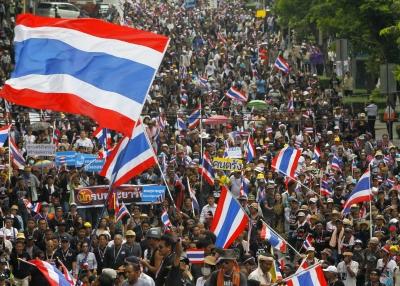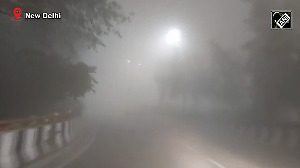 Thousands of flag-waving Thai protesters stormed more government buildings as they intensified their mass political rally against embattled Prime Minister Yingluck Shinawatra for a fourth day on Wednesday, plunging the polarised nation deeper into crisis.
Thousands of flag-waving Thai protesters stormed more government buildings as they intensified their mass political rally against embattled Prime Minister Yingluck Shinawatra for a fourth day on Wednesday, plunging the polarised nation deeper into crisis.
The whistle-blowing protesters besieged major government buildings in the capital before marching towards Royal Thai Police Headquarters to show their defiance of the Yingluck administration, demanding the Prime Minister's resignation.
The demonstrators surrounded the energy ministry's offices and ordered officials at the ministry to stop working, insisting that the current administration is no longer legitimate.
They have occupied at least six provincial halls in the opposition's southern heartlands, posing the biggest challenge to embattled Prime Minister Yingluck and her exiled brother, former Prime Minister Thaksin Shinawatra, who was ousted in a coup on 2006.
The protests, sparked by an amnesty bill that could have allowed the return of Thaksin from self-imposed exile, raised fears of fresh street violence since 2010 when over 90 people were killed in a military crackdown on demonstrations by Thaksin's supporters.
The protesters have also occupied the tourist island of Phuket and said they will not retreat until they receive a signal from protest leader Suthep Thaugsuban against whom the police issued an arrest warrant on Tuesday.
Defying the warrant, Suthep, a former deputy prime minister and senior leader from the opposition Democrat party, called on protesting crowds to storm all ministries and provincial halls nationwide on Wednesday.
"Let the people go to every ministry that remains to make civil servants stop serving the Thaksin regime. Once you take over, civil servants can no longer serve the Thaksin regime.
Brothers and sisters, go seize the city hall," Suthep said. He asked protesters to march on a large office complex on the northern outskirts of Bangkok that houses a number of government agencies.
"We are very upbeat and I think we will win in a few days," Sethup told media persons as he left his de facto headquarters at the occupied finance ministry.
Protesters on Tuesday stormed the interior, agriculture, transport, and tourism ministries, ordering officials inside to leave, a day after they broke into the finance and foreign ministries and cut off electric and water supply.
The demonstrations escalated troubles for Prime Minister Yingluck since she took office in 2011 as she faced a no-confidence motion in Parliament. She convened a meeting with key government officials at Parliament to handle the protesters to various ministries.
The anti-government protests began a few weeks ago to protest against the controversial amnesty bill moved by Yingluck's ruling Puea Thai Party that could have absolved Thaksin of his graft 2008 conviction.
The bill was rejected by the Thailand's Senate. However, the move did not defuse the crisis and the opposition decided to continue latching on to another demand -- the quitting of the government which they claimed is controlled by Thaksin.
Opposition leader Suthep said today his lawyer will file petition with the Appeals Court to fight a lower court's decision to issue the arrest warrant for him. He urged his supporters to continue their protest even even if he was arrested.
On Tuesday siege of a few ministries forced officials at the centres to leave work early.
In Parliament, opposition and Democrat leader Abhisit Vejjajiva, who launched the no-confidence motion against Yingluck, questioned her integrity following failures to keep promises on policy platforms.
Opposition members of parliament accused the government of undermining economic stability through its populist policies.
Analysts said the current turmoil is a confrontation between the Thai elite and the educated middle-class who support the Democrats and are anti-Thaksin and the rural poor who are pro-Thaksin.
Pro-Thaksin parties have won all polls since 2001, and the Democrats lost to the ruling Puea Thai Party during a landslide vote that brought Yingluck to power in July 2011.






 © 2025 Rediff.com -
© 2025 Rediff.com -